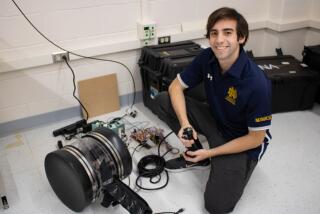U.S. Fears Soviets Winning Battle of Classroom : Caribbean Youths Get Scholarships to East Bloc Schools, Take Marxism Home
- Share via
MIAMI — Caribbean students who attend the University of Havana or Moscow’s Patrice Lumumba Institute are unlikely to go home admiring the United States or capitalism, say officials who are concerned that the Soviet Bloc is winning an important battle for influence--in the classroom.
“The Soviet system offers these scholarships to study aboard, which is quite attractive,” Jamaica Prime Minister Edward Seaga said. “They sensibly realize that if they train young minds in their direction, they go back to their countries and influence others.”
An estimated 94,000 Caribbean Basin students have studied in East Bloc nations, including Cuba, over the last decade. American business people who travel the region say they have been encountering young government and labor officials who obviously brought back a Marxist philosophy and approach.
“We run into difficulties in dealing with people who have been taught in the Communist countries,” said Pat Oliver, an American Express Corp. vice president. “We find an inability to work with them or to explain our way of doing business.”
Ambler Moss, a former U.S. ambassador to Panama and dean of graduate international studies at the University of Miami, said U.S. estimates indicated that Soviet Bloc annual scholarships in the region have nearly doubled from 7,500 in 1984.
Long-Term Investment
“It can only be because it’s paying off,” Moss said. “It’s an investment in their long-term interest in expanding their influence in the Caribbean.
“The social cleavages in many of these countries are deep anyway. So when the rich kids come back from the United States and the poor kids from Moscow, that deepens it.
“That’s not to say all of these kids come home Communists, because they don’t. But when you have all these people coming back and going to work in the ministries, labor organizations or in schools, the effects are going to be felt someday.”
Sen. Bob Graham (D-Fla.) early in 1987 introduced the Inter-American Scholarship Partnership Act, seeking $7.5 million in federal funding, to be matched by state governments, for scholarships to disadvantaged students in the region. The goal is 8,000 U.S. scholarships by 1992, contrasted with only about 1,000 currently offered.
No Appropriation
The bill was eventually merged into other measures and there was no formal appropriation. However, Sen. Daniel Inouye (D-Hawaii), chairman of the subcommittee on foreign operations, and Sen. Robert W. Kasten (R-Wis.), the ranking member of the subcommittee, joined with Graham in calling for the Agency for International Development to spend $2 million on a pilot scholarship program this year. Graham spokesman Ken Klein said the agency probably would do so.
Florida began its own program in 1985 and has 24 students from nine Caribbean and Central American nations attending four-year universities in the state, along with 15 more Caribbean students taking six-month specialized university programs.
The state put up $280,000 for 1987, with the private sector, including American Express and Chase Manhattan Bank, donating in-kind services worth an estimated $230,000, said Jeff Sharkey, state director of international education.
Entertainer Jimmy Buffett headlined a Caribbean music festival in Miami in November, which raised $85,000 cash, two new scholarships worth $10,000 each and pledges of free transportation for students by Eastern, Pan American World Airways, Air Jamaica and BWIA.
$400,000 Sought for ’88
Sharkey said that Florida Education Commissioner Betty Castor wants to boost state spending to $400,000 in 1988.
He expects any federal program to be modeled after Florida’s and will probably attract first other border states such as California and Texas.
Graham said he got worried during a 1984 visit with State Sen. Curtis Peterson to Panama, where a Florida National Guard unit was training. He found that 250 Panamanians were studying at Moscow’s Lumumba Institute, some being trained in hydraulic engineering and other fields related to the strategic Panama Canal.
Graham noted that the Kissinger Commission report that year pointed out the need for U.S. scholarships. But, he said, not much has been done. In Costa Rica, the United States offered 43 scholarships in 1985, contrasted with 1,635 by the Soviet Bloc.
Not Propaganda
“There’s a tendency in Central America to think in unilateral terms, that we have a military option, or a diplomatic option or a trade option,” Graham said. “We’ve got to have all of those plus more.”
Graham, a backer of military aid to the Nicaraguan Contra rebels, said the scholarship programs don’t involve propaganda but simply would make sure that future leaders in the other countries are exposed to the U.S. system.
“We’re not going to require these students to take any kind of mind-altering curriculum,” Graham said. “We have enough confidence in our society to take our chances being viewed for what we are.”
“You don’t have to do much more than just get them up here and let them see,” Peterson said.
No ‘Brain Drain’
Under the Florida program, committees made up of private sector, government officials and U.S. diplomats choose from disadvantaged students who apply for scholarships, Sharkey said. Foreign-government officials decide what areas of study would meet needs at home.
To ensure against the “brain drain” that is a problem for many nations in the region, the students must sign a contract guaranteeing that they will work in their homeland for at least four years.
Matthew Carrette, a student at the University of Florida, will be the first person on the island of Dominica to have a construction management degree when he graduates this year.
Felix Bolivar Campos of Panama is studying business data processing at Florida International University. That will enable him to work in one of the many banking institutions in Panama City’s financial center, he said.
Duty to Country
Michael Lew of Jamaica, the son of s shopkeeper, is studying computer engineering at the University of South Florida. With five sisters, Lew said he cannot afford school in Jamaica.
He noted that under the Michael Manley government (1972-80) that preceded Seaga’s, many students studied in Soviet Bloc nations.
“When they would come back, they would promote the socialist ideology,” Manley said. “This program offers a chance to study in the United States,” Lew said. “and I think it is a duty to help my country and let people know we have received some benefits of the United States.
“Over there (Jamaica) is where I want to live. I could make more money in the United States, but over there is where I belong.”
More to Read
Sign up for Essential California
The most important California stories and recommendations in your inbox every morning.
You may occasionally receive promotional content from the Los Angeles Times.













